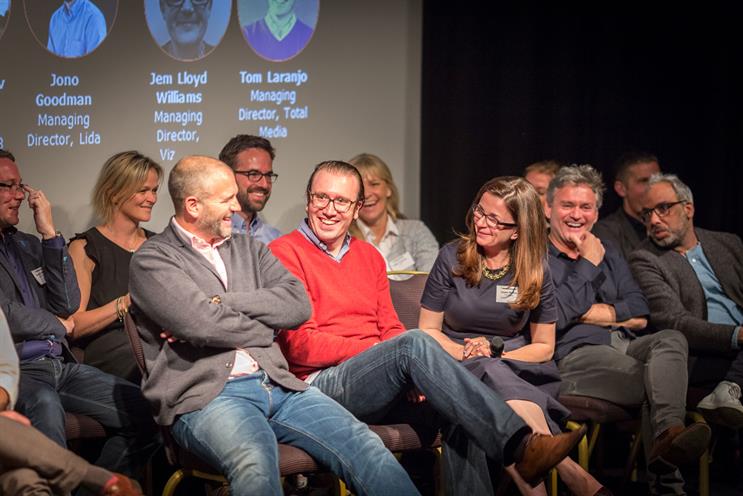
The debate, which featured a dozen marketers sharing a stage with a dozen ad agency bosses, asked for opinion on the perfect pitch process and how better briefs and relationships can be forged.
Neil Simpson, founding partner at The Corner, earned a round of applause from the audience at London’s May Fair Hotel when he suggested there should be a code of practice to ensure brands not take advantage of agencies trying to win their favour.
He said: "The IPA and ISBA put down a piece of research a few years ago which said what was the average cost of pitching for an agency. The actual cost is about £170,000 and the client’s expectation of what it cost an agency was £31,000. There’s a discrepancy there and there are some clients who are actually abusing the process to a certain degree, who are seeking ideas and maybe not being transparent about their budgets. At the end of it agencies are going full tilt at that and coming a cropper.
"It would be great if there were maybe some tighter terms and we did find it didn’t always have to be a full-blown pitch. We had one NDA which said 'through this pitch process all intellectual property is owned by the client regardless of whether you win or you don’t'. Perhaps some code of practice would help the processes."
Agencies that 'bend the rules' prosper
However, Will Abbott, the marketing director of Hiscox, suggested that the best agencies are actually those who "bend the rules" and show they are willing to go the extra mile.
He said: "The process can be very rigid and we would encourage agencies to bend the rules a little bit. It’s always the ones that bend the rules a bit more than the others, by asking for a bit more time or challenging the brief a bit more, who share work that you didn’t ask for and use that bit of insight and initiative, that have probably understood you and your brand a bit more."
Abbott's comments were timely after this week saw Hiscox appoint Abbott Mead Vickers BBDO as its creative ad agency, following a pitch which included eight-year incumbent VCCP, Anomaly and Wieden & Kennedy London.
"Honesty" and "transparency" were recurring words from both agency and brand sides of the debate, which was chaired by Oystercatchers chief executive Suki Thompson.
Jason Gonsalves, chief executive of Mcgarrybowen, said a pitch he worked on for Google was "amazing" because: "They sat there and said ‘this is what terrifies us about the business case and this is what we’re really worried about’. They talked about it with incredible conviction and honesty.
"They really got under the skin of the product and that’s amazing, that honesty about what the problem is. I would rather that than someone selling to me in the way that you sell to consumers."
Beware 'brief degradation'
The weaknesses of having a pitch process were laid bare by marketers on the panel, such as McLaren group brand director John Allert, who described how a once great relationship with VCCP had stagnated due to what he called "brief degradation".
Allert said: "We all probably know somebody who’s been absolutely fixated winning. They seem so focused on the day they lose sight of the fact they’re getting married and will be in a marriage for hopefully a long time.
"We probably felt that same issue, we had a fantastic pitch that VCCP won some years ago and we peaked with probably the best pitch brief we’ve ever come up with and necessarily therefore got the best work. The great shame, though, was that brief degradation over a period of time.
"To this day, I know to my great shame, the best piece of work we ever got out of that agency in a year in which they won agency of the year was actually the work they did for us in the pitch. Any brief we did consequent to that just got more and more vague and less and less insightful and we ended up with worse and worse work through no fault of theirs at all. In summary, we were shit!"
'Don't dazzle us with bullshit'
According to Rebecca White, head of marketing and brand at Heathrow, agencies can get so lost in "dazzle and sensationalism" during a pitch that they lose sight of the brand and the client’s objectives.
"I can see the execution, but where’s the idea?" White said. "How do I translate that to the people on the floor? How do I translate that to the C-suite, I don’t know. So the pitches that go wrong are the ones where I’m absolutely dazzled by what I see and I can’t find the brand."
White did not refer to the advertising and CRM pitch Heathrow ran earlier this year in which Havas London and Havas Helia triumphed.
The fear of being "dazzled" was echoed by Hamish Rickman, the vice-president of marketing at Virgin Atlantic, who argued there should be a "course-correcting moment" where the brand should stop the agency from veering off course.
Rickman said: "There should never be the situation where they are dazzling you with a load of bullshit and you can’t see the idea because hopefully they would have been course-corrected throughout the process.
"I understand this desire to have ‘one-up’ on your Omnicom rival or whomever it might be can sometimes be a little distracting and frustrating from a client perspective where once they’ve been appointed all they’re fussed about is whether they’ve won more awards. I think that’s down to relationships."



.jpg)


.jpg)